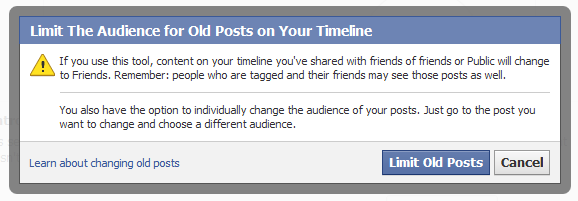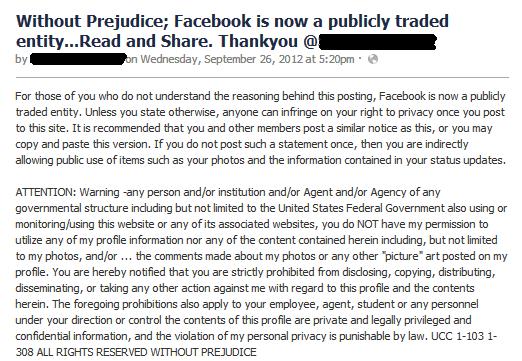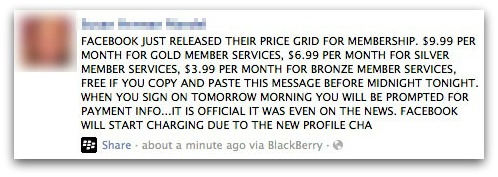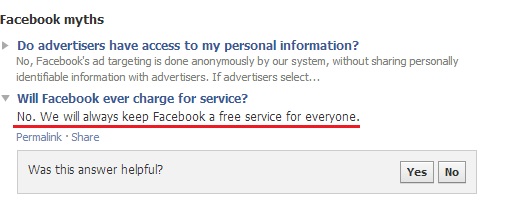 One of the consequences of a large network such as Facebook is the ongoing circulation of content by users. When a post seems relevant and urgent average users are almost guaranteed to pass it on to their network, seeing it as a charitable gesture. Posts are just as likely to contain false, inaccurate, or misinterpreted information as they are to contain the truth.
One of the consequences of a large network such as Facebook is the ongoing circulation of content by users. When a post seems relevant and urgent average users are almost guaranteed to pass it on to their network, seeing it as a charitable gesture. Posts are just as likely to contain false, inaccurate, or misinterpreted information as they are to contain the truth.
The problem is that average users will rarely check the posts in their feed for false information. Sometimes the message is so urgent that users think they don’t have enough time to check if it’s true; usually they just take a post at face value. After a post is shared tens of thousands of times, the prominence of the information feeds its veracity. Soon, a rumor becomes fact and everyone gets duped.
Since every Facebook user has the use of the network in common, news regarding Facebook is relevant and urgent to everyone, and thus becomes some of the most far reaching bulletins. Several Facebook misconceptions have been making the rounds lately, the sharing of which helps no one. Here are some Facebook rumors that have been causing panic and misplaced anger.
Facebook is Posting Your Private Messages on Your Wall
Starting in September 2012 reports of a glitch that caused past private messages to be displayed on users’ timeline began to surface. Needless to say, the idea that messages that were supposed to be private could be publicly available for everyone caused quite a stir. We all know that people say things behind closed doors that wouldn’t be considered acceptable in public.
Facebook and several investigative journalists put themselves on the case immediately, trying to ascertain what was happening. Facebook reported that the supposed messages were actually older wall posts that users didn’t remember posting, and issued an extended statement through TechCrunch. After several days of trying to corroborate or refute the reports, industry leaders Mashable and TechCrunch conceded that Facebook’s explanation was likely true and that not a single instance of private messages being transferred to Timeline could be confirmed.
The reports initially surfaced in France during the International rollout of timeline. Timeline allows users to quickly scroll back years, and they’re looking at posts from 2007 before they know it. Early on, users didn’t have the option of commenting or liking wall posts, and the limited nature of the network meant that most users shared personal updates more generously. Since there were no comments, users would sometimes use back-and-forth wall posts to converse, which mimics the messaging feature. Even though this case is closed as far as we’re concerned, the false allegations will circulate for months. There is an option in your Facebook Privacy Settings to limit old posts, which will change the permissions of older posts from public to friends only.

By utilizing the Limit Old Posts feature, you can instantly change the permissions of all older posts that were initially set to public or friends of friends, to friends only. This isn’t a complete solution, but it’s a start.
You can also hide all your posts from a given year:
1. On the right sidebar, click on the year you want to hide posts from.
2. In the box that aggregates all your wall posts and says “X number of people have written on your wall,” there’s an “edit or remove” option. Click it.
3. Click “Hide from Timeline” and your posts from that year will be hidden from your timeline.
What’s even more intriguing is that some users are still swearing that this is happening, even after dozens of news outlets debunked reports and Facebook issued their own statement. Recent reports from users of the Social Media Sun Facebook group cite Kelby Carr, a moderately popular parenting blogger, as a user that insists her private messages were posted to her timeline. Another website, Cool Mom Tech (starting to see a pattern of Mom Bloggers here?), has retained their post claiming that there were in fact messages posted on their timelines, even though the resounding demand from their community for proof forced them to delete comments that pointed out their lack of proof, circumstantial or otherwise.
I still haven’t saw any proof of this happening (messages and wall posts are distinguishable in several ways, so this would be a very easy incident to prove), so I have to say that I’m more than skeptical. I believe that there are people who believe that some of their older wall posts were messages, but I do not believe that this is actually occurring.
Facebook User Privacy Statement
There are instances of users trying to assert legal rights over their social media profiles dating back several years. In the last few months however, a post that claims to protect an individual’s privacy rights has circulated heavily on Facebook. Here is the latest version I’ve seen:
Facebook User Privacy Notice
For those of you who do not understand the reasoning behind this posting, Facebook is now a publicly traded entity. Unless you state otherwise, anyone can infringe on your right to privacy once you post to this site. It is recommended that you and other members post a similar notice as this, or you may copy and paste this version. If you do not post such a statement once, then you are indirectly…allowing public use of items such as your photos and the information contained in your status updates.
PRIVACY NOTICE: Warning – any person and/or institution and/or Agent and/or Agency of any governmental structure including but not limited to the United States Federal Government also using or monitoring/using this website or any of its associated websites, you do NOT have my permission to utilize any of my profile information nor any of the content contained herein including, but not limited to my photos, and/or the comments made about my photos or any other “picture” art posted on my profile. You are hereby notified that you are strictly prohibited from disclosing, copying, distributing, disseminating, or taking any other action against me with regard to this profile and the contents herein. The foregoing prohibitions also apply to your employee, agent, student or any personnel under your direction or control. The contents of this profile are private and legally privileged and confidential information, and the violation of my personal privacy is punishable by law.
UCC 1-103 1-308 ALL RIGHTS RESERVED WITHOUT PREJUDICE
This rumor is an extension of an urban legend about entrapment. According to some people, if you ask an undercover police officer “Are you a cop?”, then they must tell you the truth, or risk getting their case thrown out due to entrapment. This couldn’t be farther from the truth, but the idea of a legal talisman that could be used to protect oneself from punishment is so strong that even intelligent people want to believe it.
To clarify your rights as it pertains to Facebook, all you need to do is refer to their Terms of Service. When you created your Facebook account you agreed to both the Terms of Service and Privacy Policy, and as long as you have an active Facebook account you’re subjected to those terms. You cannot alter those terms by posting a rudimentary notice, and you can’t restrict the rights of entities that aren’t pursuant to those terms in the first place.
As for the content you create through the Facebook platform, you are still the official copyright holder of said content. Facebook maintains non-exclusive rights for reproduction and display of that content that are transferable as they see fit and royalty free. You can revoke Facebook’s right to publish your content by terminating your account, but they would still retain those rights if friends of yours shared that content and it’s still live on their network, even after you deactivated your account. It’s a strict policy, but it’s the cost of being available on Facebook.

The above post is an example of the useless privacy notice that users began posting shortly after Facebook went public.
An interesting note attached to the notices cites UCC 1-103 1-308 as the basis of jurisdiction for the claim. The UCC refers to the Uniform Commercial Code, was developed by private organizations to harmonize state laws as they pertain to commercial transactions, and is itself only a recommendation, not law. The specific provisions pertain to common law’s seniority over the UCC, and the rights of an individual to insist that the UCC be construed in harmony with common law. These provisions are often misinterpreted by conspiracy theorists as evidence that the government has enacted a Uniform Code in place of Common Law because the nature of the Federal Reserve diminishes the rights of the government under Common Law.
The simple truth is that posting this privacy notice or any similar notice on your Facebook wall has no legal power whatsoever. You are subject to Facebook’s terms of service for as long as you are a user, but have the right to discontinue your use at any time. In turn, Facebook has no authority over state and federal law, and depending on which documents and authorities hold jurisdiction over other users, Facebook, the U.S. government, or International treaties may have little recourse if another user violates your rights.
Facebook Will Begin Charging for Service
The status of the Facebook platform as a method of communication, as well as a multi-billion dollar company makes it a favorite subject of speculation among users. Since it’s the only thing all one billion users have in common, it has also become a favorite subject of malicious parties looking to spread messages and viruses.

Status updates like the one above were engineered to inspire fear in the hearts of Facebook addicts, and solicit them to join a faux group that was supposedly campaigning to keep Facebook free.
The rumors about Facebook becoming a paid membership platform were first seen in 2009. It started out as a plain message that seemed like legitimate news. Soon the virility of the message was picked up on by hackers that added a specific cost, $4.99 per month, and the option to join a Group to support a campaign to keep Facebook free. The page that hosted the group was a trap that when triggered by clicking on certain elements began limiting the control a user had over their browser while malware loaded itself onto the victim’s computer in the background. Users began circulating a counter message a few days later that warned others of any message stating that Facebook would start charging and asking them to join a group.
In February of 2010 another status update began circulating with a similar message, this time proclaiming the cost to be $3.99, but also directing users to an off site page that triggered the transfer of malware. In response to the rumor that Facebook would begin charging, and in an attempt to curb the spread of viruses to concerned users, Sheryl Sandberg addressed the issue in an interview with BusinessWeek. “The answer is no, we are not planning on charging a basic fee for our basic services. Once again, that question stems from people thinking we’re growing so quickly, we’re running out of money. We’re growing really quickly, but we can finance that growth. We’re not going to charge for our basic services”. Facebook has since posted their response on several pages throughout the site.

Facebook explicitly states that their basic service will remain free forever in several places throughout their website, including below Facebook Myths on the security FAQ page.
Later renditions of the rumor were even more creative, and one in July of 2011 was spurred by a fictitious article in the Weekly World News. This case was fueled by the promise that users who posted the rumor as a status update to alert the masses wouldn’t be charged, which exacerbated the problem. Since then other rumors have played on the notion of tricking users into spreading the hoax, some even stating that posting the rumor would turn your icon blue or initiate a “Gold Membership”. Some jokesters even went as far as adding a blue gradient to their profile photos or creating a “Gold Membership Card” to add validity to the claim before posting.
Facebook has stated several times that their basic service would always remain free for everyone. That doesn’t exclude the possibility of Facebook adding a premium account tier, but an announcement of that magnitude would be reported by far more trustworthy sources that Billy Bob, your drinking buddy from high school. In fact, the substantial lead that LinkedIn’s freemium model has over Facebook when it comes to Revenue Per User (almost 20 times as much per user hour) suggests that a tiered membership where paid users have access to advanced features would be a positive move for Facebook. If you notice, Facebook always takes care to refer to “basic service” when denouncing a mandatory membership fee. Nonetheless, Facebook has never officially stated that they would consider any form of paid membership, and they’ve reiterated their plans to keep basic membership free in every instance.
Can We Handle the Truth?
These rumors persist despite the fact that they’ve been debunked by several third parties and Facebook themselves on many occasions. The users who propagate these myths are made up of a mix of users that actually know better, but have ulterior motives, as well as users that believe them to be true.
A general rule of thumb is that if the only source of information is a Facebook status update, it’s probably false. Even if a report sounds reliable it’s best to fact check your sources by visiting popular news outlets of searching through the database of rumors at Snopes.com. Facebook maintains several official channels as well; so why would anyone think that their aunt Betty got the scoop over Mashable or TechCrunch? The world may never know, but you can with a little bit of due diligence. After all, it’s your integrity on the line when you spread inaccurate rumors.
- Blogging Isn’t a Rocket, It’s More Like a Roller Coaster - August 19, 2025
- Value vs. Expectations: The Fight for Startup Survival - July 31, 2025
- The Evolution of Marketing: From Catalogs to Cat Blogs - November 8, 2022
- How to Make a Tweet This Link - February 5, 2022
- Dramatically Improve Marketing Results with Advanced Analytics - September 20, 2021
- The Next Chapter for Social Media Sun - June 4, 2013
- Optimizing Your FAQ to Maximize ROI - December 5, 2012
- Weapons of Influence and Klout’s Role in Marketing - November 17, 2012

Thanks Adam…perhaps some of my “friends” will listen to you! I’ve learned to ignore most of the panic…and a deep breath often helps…
Well written. Any message that says “spread this to all your friends or else” should by default be seen as a delete / do NOT spread. Sure, there are rare exceptions and these can always be identified using a bit of common sense and (as Natasha writes) a good deep breath :o)